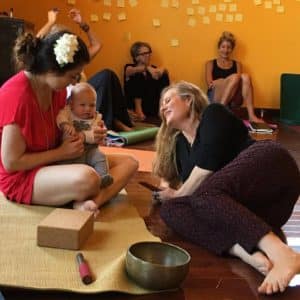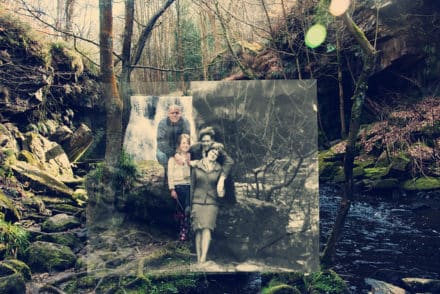By Meg Pier
“If you have special circumstances, please tell us,” announced a sign at the registration table.
I felt a combination of relief and skepticism, an internal tug of war between hope I’d get what I came for–and certainty I wouldn’t.
“I’m sure everyone thinks their circumstances are special,” I babbled to the attendants. “But my mother is dying and things aren’t finished between us. I got here late but it wasn’t my fault. I really, really need a hug.”
And I wanted it from no less than someone considered by millions to be a divine mother.
Hindu spiritual leader Mata Amritanandamayi is also known to her followers as “Amma,” or “Mother” in the Indian dialect of her native Kerala. Amma’s ministry is hugging people, which she considers a manifestation of her darshana, or divine vision. Through a series of world tours over the past three decades, the rotund guru has embraced more than 36 million people—roughly the same number of people who have seen the Rolling Stones in that time period.
When I had happened to hear that the mystic would be practically in my back yard in a few days, I thought, “What the hell.” As a lapsed Catholic who was struggling to believe in anything, I needed whatever help I could get.
My mother had been diagnosed with a recurrence of cancer that had claimed half of one of her lungs five years earlier. I loved my mother deeply but her frequent brushes with death had left me so exhausted, addled and angry that at times I felt about to spontaneously combust.
In fact, Mom and I had always had a complicated and often fiery relationship–and her slow, painful decline had not changed that. Now, as always, neither she nor I seemed to understand where one began and the other ended. Our enmeshment often meant we spoke truths that should never be said out loud and were outraged when one couldn’t read the other’s mind.
Since I was a child, my mother had a saying she spat out at me when angry, “I love you, but I really don’t like you sometimes.”
It was mutual.
Even though she was now possibly just breaths away from the beyond, the reality that we still often didn’t like each other hadn’t changed. That stark recognition sometimes made me feel I didn’t deserve to be alive myself.
So on a stifling summer morning, I set off on my Amma pilgrimage–a maniacal rush hour run from Boston’s North Shore to a suburban Marriott Conference Center. Ignoring the voice in my head that questioned the likelihood of enlightenment in a chain hotel, I screeched into a parking spot. Slamming the car door, I began to trot, darting around a stream of disciples flowing toward the Soviet-style building, determined to beat them all to the front door.
Entering the warehouse-like building, I immediately felt disoriented by the throngs of white-garbed women drifting haphazardly in different directions. A disembodied female voice wafted over a loudspeaker in a soothing British accent; with the sound system’s tinny echo, I could only catch the word “mother” surfacing now and then.
Beginning to acclimate in the sea of soulfulness, I took my cues from the more practiced Amma devotees around me. Taking off my sandals, I dutifully placed them in a huge cupboard along with thousands of others, and fell into place in a long line, seemingly sleepwalking toward that blessed bear hug.
When I finally reached the middle-aged pair of women at the registration table, they looked at me solemnly as my confused angst spilled out.
“I am so sorry but there simply aren’t any more tokens for specific seatings,” one of them said, gently interrupting my streaming plea. “You can wait if you’d like. She should be able to see everyone by the end of the day.”
Seatings? I was not waiting for a five-course meal in a four-star restaurant, I was waiting for a hug from a divine mother!
I stood very, very still. An immense wave of emotion surged within me, the likes of which I hadn’t felt in a while. It figures, I thought. Everyone else in Amma’s orbit is in Nirvana and I am having an attack of rage. The very karma I hoped to evolve beyond.
My stomach muscles began to contract, and I was unable to contain a torrent that had long been in the making. In the midst of a serene sea of saris, I began to sob uncontrollably.
Out of nowhere, I felt someone’s arms around me. A woman murmured, “We feel sad when we think we are apart. We aren’t apart. You aren’t apart.”
I was, in fact, completely falling apart. I continued to convulse as the stranger repeated, “Just breathe,” while guiding me gently to a nearby chair. As my gulps for air became deep breaths, the woman cupped my chin in her hands, looked at me with clear grey eyes and smiled.
“Just keep breathing,” she advised and then seemed to dissolve into thin air.
As my panting subsided, I was struck by how the woman’s choice of words was actually uncanny. “Apart” was exactly how I felt. Alone. Disconnected. Exiled. The Prodigal Daughter.
I had a sudden vision of my mother as an adolescent in her Depression-era childhood home. I could see her bravado as she clamored for the attention of her mother, a saint of a woman who had her share of crosses to bear. Two boys fighting the good fight in the South Pacific; a husband who risked his life daily as a fire department captain; an invalid daughter who would die at the age of eight; a needy blind sister; and a mother who had come for Sunday dinner one week, had a massive stroke, and became another member of the high-maintenance household.
Eyes closed, in my mental movie I witnessed my mother’s confused hurt and disappointment when she was scolded for the frivolity of being a child. From the tenth row seat of my imaginary theater, I could see that my grandmother didn’t have the time to nurture the spirit of a girl who might have been very much like me.
In a moment of clarity, I realized you can’t give away what you don’t have. Maybe finally, at the half-century mark myself, I could at last accept my mother for who she was.
This epiphany was followed by the realization that I had just made a supreme ass of myself with what my mother would have called my dramatic “water works,” her term for a good cry.
I began to giggle. I felt light with liberation. Making a note to myself to break down in public more often, and full of new resolve, I marched back toward the women who had turned me away earlier.
“You’re the one with the mother, right?” one them asked me eagerly.
Aren’t we all? I thought, but nodded in affirmation.
“Someone just turned in a token!” she crowed victoriously.
The other woman grabbed my arm. “Come with me!”
This was like the spiritual equivalent of winning Megabucks. But was salvation even possible for someone with such despicable ambivalence for her dying mother?
I didn’t have time to wonder. The woman yanked me across the cavernous hall to a line of the faithful extending out from a cordoned-off area. On a raised stage, sat Amma, immense, on a throne of pillows.
From the rear of the Amma access zone, I watched the inner-workings of the hugging machine in motion. I realized that the outer chair of each row—what would be called the “first seat” in an orchestra—was actually a line of people chair-hopping and advancing toward Amma. As each new person reached the front row, a team of white-garbed attendants sprang into action, very professionally manipulating and folding the disciple into a kneeling position, then thrusting their head into Amma’s ample bosom.
Amma embraced each person fiercely for a few seconds and then disengaged. A staff member dispensed something silvery to the acolyte, and then nudged them away. It all looked very organized and orderly. An Amma assembly line.
Now I was in the fast-moving tributary feeding into the welcoming shoreline that was Amma. I wondered, what was the protocol for receiving a hug? The proper expression to have on my face? What to do with my hands? Should I be as excited as a kid in line for an ice cream cone? Or should I be solemn, as though about to get communion?
I soon found myself in the launching pad for Amma’s lap. A bearded man said tersely, “Take off your glasses and give them to me. Do you have anything sharp?”
Speechless, I removed my specs and shook my head no, feeling like I was going through airport security.
The bearded man had me on my knees. I could smell Amma’s pungent musk six feet away.
I was propelled forward, shaking violently when I made impact with Amma. Going down for the hug, I noticed her white robes were filthy with the residue of others. Amma herself was perspiring heavily, her thick black hair matted and her broad brown forehead shiny. She spoke a few words of what I assumed must be Sanskrit. Then, I was lifted off her and something was placed in my palm. A Hershey’s Kiss. Un-wrapping the sweet I thought, “Mission accomplished.” But rather than jubilation, all I felt was an emotional hangover.
Emerging into the sunlight from the frigid air-conditioning, my deflation morphed into recrimination—not at Amma but at myself.
What the hell is wrong with you? I thought to myself. You got what you came for, didn’t you?
As I unlocked my car, I recalled the hug of the grey-eyed stranger, and the compassion it conjured up for my mother. Could that forgiveness extend to me too?
Maybe I’m expecting more of myself than I can give. Maybe I’ve been the best daughter I know how to be.
My cell phone rang.
It was my mother.
“Meg, are you sitting down?” she exclaimed. “I just got the results of a new CAT scan—the tumor is gone!”
My mother lived another five years—apparently our shared darshana of acceptance and forgiveness required time to manifest. By the time Mom died, my expectations of both her and myself had evolved. In the end, our imperfect love overcame all the instances when we hadn’t liked each other. Eventually, what we each had to give each other was enough—and then some.
Can Amma take any credit for this? All I know is I’ve never felt the need again to stand in line for a hug.
Meg Pier is a former public relations executive who jumped off the glass ceiling eight years ago to follow her bliss–namely to travel and write. Her pieces on travel and art have appeared in The Boston Globe, Art New England and Provincetown Arts. She blogs blog about travel, cultural traditions and spiritual practices on www.ViewfromthePier.com.

Join Lidia Yuknavitch and Jen Pastiloff for their signature “Writing & The Body” Retreat in Portland March 17-19 by clicking photo.






1 Comment
A moving piece. Meg captures the essence of acceptance and self compassion with real honesty. Looking forward to reading more from her!